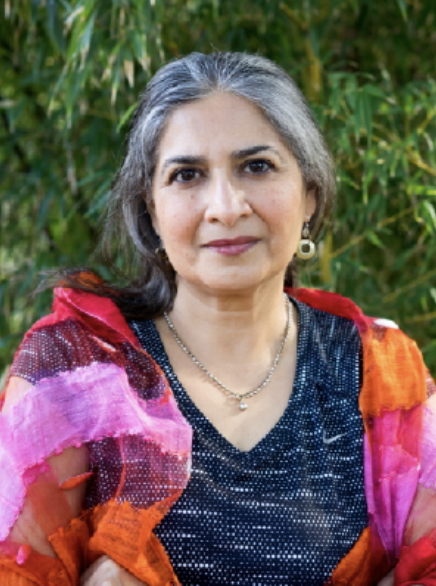 Presentation by Kalpana Asok, LMFT
Presentation by Kalpana Asok, LMFT
1.5 CEUs available for LMFTs, LPCCs, LEPs, and LCSWs
Interview with Kalpana Asok
This event will be in person at Micheal's at Shoreline and also offered as a live stream event. There is plenty of space for distancing, and we will follow all covid protocols including all attendees signing a covid-19 liability release form. Luncheon registration includes lunch buffet, dessert and drinks. Michael's at Shoreline is a beautiful venue with outdoor patios for breaks and eating. A recording of this presentation will be available to all registrants for 3 months.
Many clinicians feel overwhelmed when they see South Asian families in their practice, often staggered by the extremely fragmented and acute situations they bring in. Many clinicians wonder why the families did not access help before such dire circumstances arose given that the families might have had access to education and financial ability to access help.
This presentation is a psycho-social and cultural review of South Asian immigrant families. It will help you understand how the community conveys an inter-generational transmission of values to achieve material, artistic, and cultural achievement. In that vast diasporic influx, families often sacrifice the emotional well-being of their children and even connection with their children on the altar of super-achievement and peer pressure.
This presentation will offer a review of the South Asian family in order to understand how they are located along the lines of privilege and pressure and help clinicians place their clients along a spectrum of immigrant stress. This zoomed-out vision of the families can help clinicians understand pressure on the people they are helping.
Program Goal
The goals of the presentation include a more nuanced understanding of the stressors both cultural and social that contribute to families loading their children with their own un metabolized difficulties as immigrants. As a visible and economically successful group, this immigrant community has a lot to offer the country and the world. The children thrive in spite of the huge stressors they face from within. To help this community's general mental health, it is important that clinicians understand their inner lives.
Learning Objectives
- Identify at least 2 stressors in the community that are extra-familial
- Name at least 3 kinds of immigrant privilege in some immigrant families
- Identify 2 ways how "clumsy dating" & social contract marriages impact child rearing
- Be able to name 3 ways how families choose connection over individuation
About the Presenter
As an independent practitioner therapist with over 25 years of experience in the south Bay area, Kalpana Asok, M.S., M.A., L.M.F.T primarily serves clients of the South Asian immigrant community which is especially large in the Bay area. She works with adults— individually and as couples. People seek her out for her skill and expertise in working with this population. She integrates a great amount of social and cultural awareness of the client's family and immigration circumstances together with clinical experience. Her book on the cultural nuances of the South Asian community has been well received both by therapists in the wider population and by young adults in the South Asian community. An area of special interest is working with gifted high-achieving adults. She is also a published poet channeling some of her reflections of identity and experiences as a South Asian immigrant, a parent, and Silicon Valley resident into poetry. She can be reached through her website at www.calmtherapy.com.
Articles:
Asok, K. (2021). Calling in and calling out. Fort da, 27(1), 1-12.
Asok, K. (2011). Cultural trends of sending children back to homeland can cause trauma. The Mercury News. Retrieved from http://mercurynews.com/
Books:
Asok, K. (2018). Who's baby is it anyway? Inside the Indian heart. Astoria, NY: IPBooks.
Asok, K. (2018). Everyday flowers. Poems. Astoria, NY: IPbooks.
Presentation Outline
Introduction
Identifying some of our biases
Why do we need to know about this group
Identifying good in the culture
How I begin
Locating the family along immigration history and family bonds
Lens of privilege
How the couple came to be
Arranged marriage, non-arranged marriage, clumsy dating as impacts on family
Infancy to pre-school stressors
Middle school difficulties
High school to college problems
Revisit biases
Question and Answer time
TARGET AUDIENCE: LCSW, LMFT, LPCC
If you miss any of the presentation, you will not be eligible for the CEUs. SCV-CAMFT is a CAMFT-approved Continuing Education Provider (CEPA 052466). This course meets the qualifications of 1.5 continuing education credit for LMFTs, LPCCs, LEPs and/or LCSWs. SCV-CAMFT maintains responsibility for this program/course and its content.
The views expressed in presentations made at SCV-CAMFT membership meetings or other SCV-CAMFT events are those of the speaker and not, necessarily, of SCV-CAMFT. Presentations at SCV-CAMFT events do not constitute an endorsement of the vendor or speaker's views, products or services.
EVENT POLICY INFORMATION
